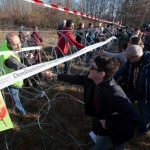Significant changes coming to the EU’s migrant policies.
“Croatia is pleased with the agreements reached on Thursday by the parties of the German ruling coalition, as well as Austria and Germany, on the future policy towards migrants and asylum-seekers who have already been registered in one of the European Union countries,” said high sources from the Croatian government. The agreements are similar to proposals which Croatia has been pushing for from the start. According to the agreements, Germany will carry out status check procedures at police facilities at the border with Austria, and those migrants who have already been registered will be returned to the countries where they were first registered after entering the EU, primarily Greece and Italy, reports Jutarnji List on July 7, 2018.
German Interior Minister Horst Seehofer said on Thursday in Vienna that asylum-seekers from the German border would not be returned to Austria, but to Greece and Italy. “They will be returned from the reception centres that will be established near the Austrian-German border,” Seehofer said after his meeting with Austrian Chancellor Sebastian Kurz. “No one wants Austria to be responsible for the asylum-seekers for whom Italy and Greece are responsible,” he said, delighting his Austrian hosts, but also Croatia.
“We are not the first country of entry and this agreement is of the utmost importance to us,” said a Croatian source. Namely, this agreement means that migrants who entered Croatia from Bosnia and Herzegovina and proceeded to Austria and Germany will no longer be returned to Croatia, as it has been the case so far, but to Greece, where they first entered EU territory. Furthermore, the Austrian-German agreement has saved the open borders within the European Union. Austria was ready to introduce controls at its borders and perhaps send its police officers further to the Schengen border with Croatia. In that case, Croatia would find itself in a very difficult situation because, as a member of the Union, but not of the Schengen area, it could have become a migrant hot spot. But this has now been avoided.
“Nobody wants to accept the abolition of Schengen. For a year now, we have had border controls at some internal borders of the European Union, and it has already brought bad economic results. It is in Germany’s interest to rescue the Schengen system,” said the sources.
The recent visa liberalization – for example, for Iranian nationals travelling to Serbia – has brought Croatia new potential problems. On Croatia’s insistence, this issue was also highlighted at a recent session of the European Council and further pressure was applied to Serbia. Iranian citizens can now reach Serbia without visas and then illegally move through Bosnia and Herzegovina towards Croatia and further into the European Union. In these cases, Croatia is the country of their first EU entry. “We will not allow them to enter. We are determined to protect ourselves from any attempt to illegally enter our country,” said sources from the government.
Croatia currently has about 6,600 border police officers who are closely monitoring the border with Serbia, Bosnia and Herzegovina and Montenegro, which is more than all these three countries have put together. It is expected that the European Commission will propose new, stronger measures to protect the EU’s external borders in the autumn. This was confirmed in Vienna by European Commission President Jean-Claude Juncker, after meeting with the Austrian government. One of the measures, Juncker said, is the strengthening of Frontex, the European border and coast guard agency. According to this plan, Frontex should have 10,000 members by 2020.
Croatia strongly supports the strengthening of Frontex and better cooperation with this agency. “In the next period, Croatia will further strengthen the technical component of its border monitoring. We have acquired patrol boats, set up radar systems on the islands to protect the maritime borders, and now we are moving towards further strengthening the protection of our green borders. We have already agreed on the engagement of a Frontex aircraft which will monitor the green border with Bosnia and Herzegovina and Montenegro, and the sea border with Montenegro and Italy,” said a source. The aircraft will be operated by Frontex employees, but the data will be shared with Croatian services.
This agreement should be concluded next week at a meeting at the Frontex headquarters in Warsaw. In addition, there are also plans for the installation of additional cameras and for the use of drones in the surveillance of the green border. Strengthening the protection of the border comes at a time when it is increasingly evident that the Bosnian police force is struggling with controlling the increasing number of migrants in the country. “In March of this year, we warned their ministry about potential problems. We offered them assistance in the organization of the police forces. But there was no response. For more than two years, nothing was done, and now they are blaming the European Union for everything,” said Croatian sources.
“What Germany and Austria are advocating today is closer to what Croatia has been doing and advocating, and this is legal, sustainable and controlled migration, but not illegal migration,” said Croatian Interior Minister Davor Božinović. He pointed out that the government was open to legal migration through resettlement. “Croatia is demonstrating the principle of solidarity in action, but it does not allow uncontrolled, illegal migrations, which sooner or later become a problem for countries which allow it,” Božinović explained.
Regarding the issue of returning migrants who have already been registered in an EU member state, the minister said that Croatia had no problem with that since it only accepts refugees which have first been registered in Croatia. He concluded that he would not allow Croatia to become a migrant hot spot.
Translated from Jutarnji List (reported by Krešimir Žabec).








